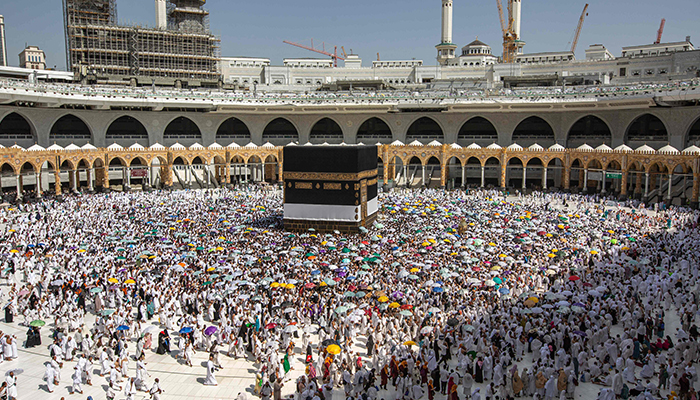Coronavirus vaccine ‘not required’ for Haj 2024
“The condition for corona[virus] vaccine has been abolished," ministry announces
ISLAMABAD: The Ministry of Religious Affairs and Interfaith Harmony said Monday that those performing Haj next year would not need to show proof of COVID-19 vaccination.
In a statement on X, formerly Twitter, the ministry said: “The condition for corona[virus] vaccine has been abolished. Haj pilgrims do not need to submit their coronavirus [vaccination] certificates.”
The Saudi authorities revoked major restrictions this year in June for the Haj pilgrimage, which returned to its maximum capacity for the first time since the coronavirus pandemic.
Around 2 million people gathered at Islam’s holiest site to perform the pilgrimage after the Saudi authorities invited people from across the globe following the abolishment of curbs.
Over 2.4 million performed the pilgrimage in 2019, while in 2020, due to the curbs imposed because of coronavirus lockdowns, Saudi Arabia restricted the attendance to a few thousand citizens and residents.
In 2022, around 900,000 were able to perform Haj after the Saudi authorities allowed limited numbers of foreign pilgrims.
The Ministry of Religious Affairs on November 27 opened the registration for Haj 2024 under the government scheme and the process is set to continue till December 12.
The applications can be submitted on a passport valid till December 16, 2024, and the Haj application can also be processed on a passport application token.
The ministry’s spokesperson said about 89,605 Pakistanis will perform Haj under the government scheme next year.
Balloting will be conducted if more than the prescribed number of applications are received.
For the first time, women will have the opportunity to undertake the sacred journey without the traditional requirement of a male companion.
Under the sponsorship scheme, 25,000 seats will be allocated on a first-come, first-served basis.
-
Security forces gun down 30 terrorists in multiple IBOs in KP: ISPR
-
MQM-P calls for new province in Sindh
-
US report validates Pakistan military edge over India: PM
-
Banned TTP poses serious threat to Pakistan security: UNSC panel
-
CM Afridi clarifies remarks on by-poll after ECP requests army deployment
-
Dubai sees 3.2m Pakistani passengers in 2025 as airport sets new milestone
-
Security forces kill 23 Indian proxy terrorists in KP's Kurram
-
Pakistan to construct island to boost oil exploration: report












